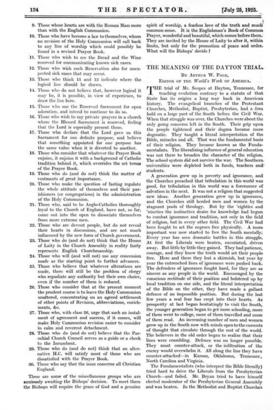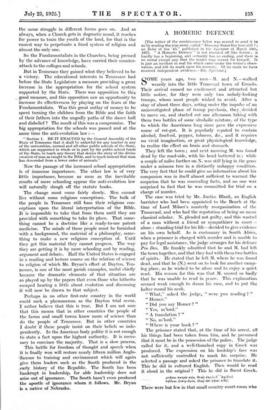THE MEANING OF THE DAYTON TRIAL.
BY ARTHUR W. PAGE,
EDITOR OF THE World's Work OF AMERICA.
TIE trial of Mr. Scopes at Dayton, Tennessee, for teaching evolution contrary to a statute of that State has its origins a long way back in American history. The evangelical branches of the Protestant Churches, Methodist, Baptist, Presbyterian, had a firm hold on a large part of the South before the Civil War.
When that struggle was over, the Churches were about the only going concerns left in the South. Their grip upon the people tightened and their dogma became more dogmatic. They taught a literal interpretation of the Bible, miracles and all. That was the fundamental basis of their religion. They became known as the Funda- mentalists. The liberalizing influence of general education was not there to broaden the character of the religion. The school system did not survive the war. The Southern. universities were depleted both in funds, teachers andi students.
A generation grew up in poverty and ignorance, and the Churches preached that tribulation in this world was good, for tribulation in this world was a forerunner of salvation in the next. It was not a religion that suggested new ideas. Another generation grew up in ignorance, and the Churches still herded men and women by the stagnant pools of theology. But by the 'eighties and 'nineties the instinctive desire for knowledge had begun to combat ignorance and tradition, not only in the field of religion, but in every other field. The Civil War had been fought to set the negroes free physically. A more important war now started to free the South mentally.
Every year has seen dramatic battles in this struggle. At first the Liberals were beaten, excoriated, driven away. But little by little they gained. They had patience, courage, and they knew the truth would set their people free. Here and there they lost a skirmish, but year by year the entrenched lines of ignorance were pushed back.
The defenders of ignorance fought hard, for they are as sincere as any people in the world. Encouraged by the conscious rectitude of their position and bolstered up by local tradition on one side, and the literal interpretation of the Bible on the other, they have made a gallant defence of an impossible position. But during the last few years a real fear has crept into their hearts. As prosperity at last began hesitatingly to visit the South, the younger generation began to get more schooling, more of them went to college, more of them travelled and more of them read. An increasing number of men and women grow up in the South now with minds open to the currents of thought that circulate through the rest of the world. The believers in the old order began to realize that their lines were crumbling. Defence was no longer possible. They must counter-attack, or the infiltration of the enemy would overwhelm it. All along the line they have counter-attacked—in Kansas, Oklahoma, Tennessee, North Carolina and Virginia.
The Fundamentalists (who interpret the Bible literally) tried hard to drive the Liberals from the Presbyterian Church—and failed. Mr. Bryan tried to have himself elected moderator of the Presbyterian General Assembly and was beaten. In the Methodist and Baptist Churchds the same struggle in different forms goes on. And as always, when a Church gets in dogmatic mood, it reaches for power to train the youth of the land, for that is the easiest way to perpetuate a fixed system of religion and almost the only one.
So the Fundamentalists in the Churches, being pressed by the advance of knowledge, have carried their counter- attack to the colleges and schools.
But in Tennessee they gained what they believed to be a victory. The educational interests in Tennessee had before the State Legislature a measure providing a great increase in the appropriation for the school system supported by the State. There was opposition to this good measure, and this opposition saw an opportunity to increase its effectiveness by playing on the fears of the Fundamentalists. Was this great outlay of money to be spent turning the children from the Bible and the faith of their fathers into the ungodly paths of the dance hall and disbelief ? The result of this was a compromise. The big appropriation for the schools was passed and at the same time the anti-evolution law :— " Section 1. BE IT ENACTED by the General Assembly of the State of Tennessee that it shall be unlawful for any teacher in any of the universities, normal and all other public schools of the State, which are supported in whole or in part by the public school funds of the State, to teach any theory that denies the story of the divine creation of man as taught in the Bible, and to teach instead that man has descended from a lower order of animals."
Now the passage of the increased school appropriation is of immense importance. The other law is of very little importance, because as soon as the inevitable results of more schooling appear the anti-evolution law will naturally slough off the statute books.
• The change must come fairly slowly. Men cannot liVe without some religious conceptions. The bulk of the people in Tennessee still base their religious con- ceptions upon the literal interpretation of the Bible. It is impossible to take that from them until they are provided with something to take its place. That some- thing cannot be a doctrine like a ready-to-use patent medicine. The minds of these people must be furnished with a background, the material of a philosophy, some- thing to make a new religious conception of. Until they get this material they cannot progress. The way they are getting it is by more schooling, and by reading, argument and debate. Half the United States is engaged in a reading and lecture course on the relation of science to religion of which Mr. Bryan's effort at Dayton, Ten- nessee, is one of the most garish examples, useful chiefly because the dramatic elements of that situation are so played up by the papers that even- those who hitherto escaped hearing a little about evolution and discussing it' will now be drawn to that subject.
Perhaps in no other first-rate country in the world could such a phenomenon as the Dayton trial occur. I rather believe that this is true. But I am not sure that this means that in other countries the people of the farms and small towns know more of science than cio the people of Tennessee. But in other countries I doubt if theie people insist on their beliefs so inde- pendently. • In the American body politic it is not enough to state a fact upon the highest authority. It is neces- sary to convince the majority. That is a slow process.
This battle for freedom of thought and speech when it is finally won will restore nearly fifteen million Anglo- iSaxons to training and environment which will again give them leaders such as the South produced in the (early history of the Republic. The South has been -bankrupt in leadership, for able leadership does not arise out of ignorance. The South hasn't even produced the apostle of ignorance whom it follows. Mr. Bryan is a native of Nebraska.



























































 Previous page
Previous page